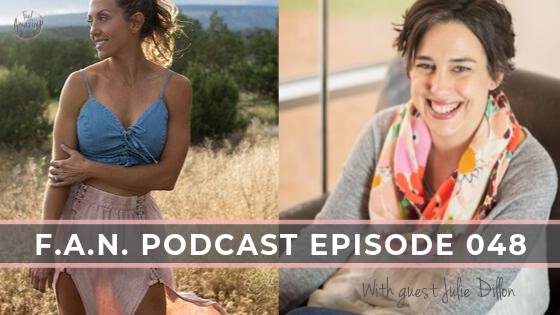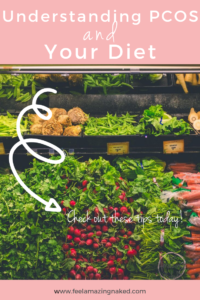Join the F.A.N. Community HERE. (It’s free and a tribe full of women who are right where you are.)
Not long ago, I was prowling around on Instagram and I discovered today’s guest, Julie Dillon. I immediately knew I wanted to have Julie on the show because she addresses a topic that I see a lot of people talking about, PCOS. And specifically, how PCOS and dieting play together.
Julie is a Registered Dietitian, Eating Disorder Specialist, and Food Behavior Expert partnering with people on their Food Peace journey. She is trained as a mental health counselor and supervises dietitians and other health professionals to help people with PCOS without dieting. Julie produces and hosts the weekly podcast, Love Food.
What is PCOS? (Polycystic ovary syndrome (PCOS) is a condition that affects a woman’s hormone levels. Women with PCOS produce higher-than-normal amounts of male hormones. This hormone imbalance causes them to skip menstrual periods and makes it harder for them to get pregnant.
Weight Tracking for Weight Loss
One of my favorite things that Julie said in our conversation is, “The number on the scale is not an indication of health.”
She isn’t opposed to weighing yourself, as long as the act of weighing holds the same weight in your mind as taking your blood pressure or your temperature. It’s when we give it more weight than it deserves that it becomes a problem.
If you are going to track numbers, you need to know that there is zero evidence that food restriction and weight tracking help people maintain a healthy weight long-term. Just understand going in that if you choose this method, it can be harmful to your long-term health.
Wading Through All of the Crap
If you Google “diet and PCOS”, you’re going to find a lot of crap. It seems like everybody is discussing PCOS but everybody has a different opinion on how to deal with it. And just like anything, there are no quick fixes.
As a society, we’ve been seduced by diet culture and products that promise to fix it all for us, while being told that we can’t trust ourselves. We have to “use this product” or “follow that plan” if we want to see results. And if we don’t lose weight, it’s because we didn’t do it right.
But honestly, diets don’t work for the majority of people.
We have to rally together as a community to say no to diet culture. We have to agree to teach our kids that dieting is not necessary, that all bodies are good no matter the size, and we have to ensure that all people have access to decent food and movement.
PCOS and Diet
One of the biggest problems with addressing PCOS through dieting is the way that PCOS affects the body’s use of insulin.
*I strongly encourage you to listen to the episode to learn exactly how PCOS and insulin react to each other. It’s way too much to put in these notes but Julie shared so much valuable information.
Without going into all the details, the body overproduces insulin when dealing with PCOS. This causes the woman suffering to feel the need to eat more than usual. And when she eats more, but her body isn’t using insulin correctly, she gains weight.
Telling a woman with PCOS to diet to control her weight can quickly lead to eating disorders because she simply can’t control her energy levels and food consumption.
“Diet culture combined with PCOS is brewing the perfect scenario for eating disorders.”
Addressing insulin levels is the key to helping women with PCOS.
Treating PCOS Without Dieting
One of the most popular pieces of advice given today is to completely avoid carbs of any kind.
The problem with this advice is that if the woman fails to follow it to the letter, the repercussions of going back to eating carbs is greater than what she was facing before. So, how do we move away from the culture of dieting and move to a healthier place?
We have to recognize that taking away entire food groups isn’t going to help most people. Women with PCOS are typically not eating enough to get the nutrients they need.
The first thing Julie does is help them assess whether they are eating enough food. And a hint; if you think 1200 calories is “enough”, you need to rethink your approach to food.
Instead of starving yourself if you have PCOS, try eating until you’re full.
Secondly, find a doctor who will help you find the right medications or supplements that will help you bring your insulin levels under control.
Third, try to eat more protein, especially in the morning. Women with PCOS typically don’t eat enough protein. This helps with insulin levels and fullness.
These steps may not sound mind-blowing but they work. Before you try that diet that denies you whole categories of foods, try these 3 steps and see what a difference they can make.
Permission to Eat
I find that women, in general, need permission to eat. We are told from a young age that we need to look a certain way, and to achieve that look, we need to avoid food.
It’s not only the women with PCOS who need to be certain they are eating enough; we all need to hear it. Don’t avoid food because you’re afraid of how you will look if you eat.
Julie has found that women who fear food also fear other things in life.
As women, it’s time to stand up and be strong and accept the fact that you deserve pleasure, you deserve to feel amazing in your skin, and just because you’re you, you are enough.
Connect with Julie Diffy Dillon here:
XO,
Amanda
Thank you for listening and reading my dear How can you support this podcast?
- Apple users, please subscribe and review our show on Apple Podcasts, we make sure to read them all. Android users, be sure to subscribe to our show on Stitcher. As a subscriber, you will get a notification each week a new episode drops! (man I love saying, “Drops”).
- Tell a friend about The Feel Amazing Naked Podcast…they will love you for it! T
- Join the Feel Amazing Naked Community (FREE). I am in here LIVE each week sharing tips, cooking and talking all things confidence and growth.
- Follow me on my favorite social media platform, Instagram.
- Share using the buttons above and don’t forget to tag me (@awalkmyway and @feelamazingnaked) when you do!


